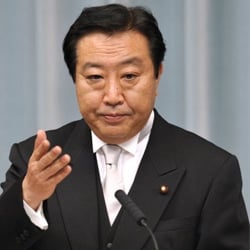 The ruling Democratic Party of Japan chose a new president, and in effect, a new prime minister, today. Japan’s newest prime minister, the sixth in five years, is Yoshihiko Noda.
The ruling Democratic Party of Japan chose a new president, and in effect, a new prime minister, today. Japan’s newest prime minister, the sixth in five years, is Yoshihiko Noda.
The former finance minister was chosen over other top runners, including former Foreign Minister Seiji Maehara and Trade Minister Banri Kaieda.
The new prime minister will face the daunting task of taking care of the 100,000 people displaced from the March 11 quake and tsunami and subsequent nuclear crisis, as well as rebuilding the devastated Tohoku region.
Despite this, the debates between the lawmakers vying for the prime minister seat spent more time fighting among their various factions’ lines than addressing the pressing issues facing Japan.
Noda created controversy earlier this month for defending politicians who visited Yasukuni Shrine Aug. 15. He said that in his opinion, Japan’s class-A war criminals from World War II are not criminals, and therefore countries such as China and South Korea shouldn’t get upset when Japanese leaders visit Yasukuni, where 14 class-A war criminals are enshrined.
In my opinion, the choice of Noda sheds light on a couple developments in the murky world of Japanese politics. The fact that he was the former finance minister, who was known for his conservative fiscal policy, shows that the Democratic Party of Japan may be emphasizing the economy over other concerns. The choice may also show disapproval for Ichiro Ozawa, a powerful DPJ lawmaker famous for making and breaking leaders from behind the scenes. Ozawa’s faction supported Kaieda, who lost to Noda by a narrow margin.
If Noda lasts as long as his predecessors, Japan will likely have a new prime minister in a year.